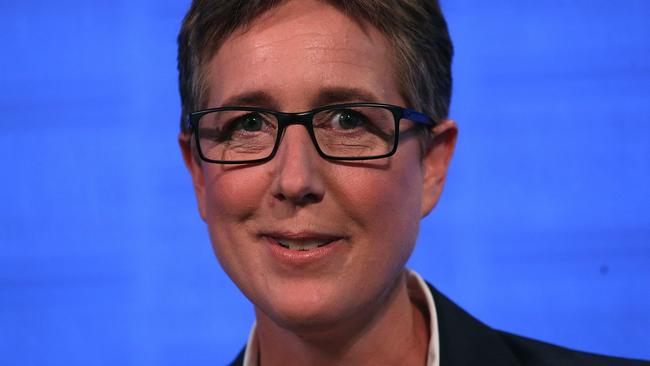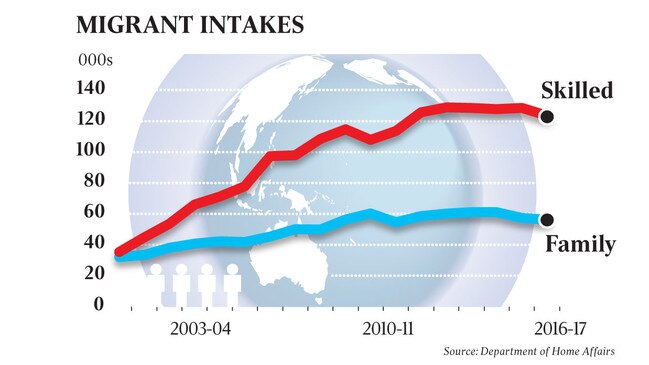Business and unions in rare alliance for Big Australia
Big business and the ACTU form an unprecedented alliance calling on government to resist calls for immigration to be cut.

Big business has joined forces with the ACTU in an unprecedented compact to back a Big Australia, calling on the federal government to maintain current levels of permanent migration amid calls for the rate to be cut.
The historic coalition of peak unions, employer groups and the ethnic lobby will release a united policy document today warning of the economic and social consequences of dropping the annual migration rate.
The ACTU’s involvement comes as it embarks on a high-profile campaign to rein in employers’ access to temporary foreign workers.
The first migration document of its kind in the nation’s history calls for the current goal of an annual intake of 190,000 to be retained, with long-term levels set proportionally to the population.
The accord will see the ACTU and United Voice, one of the most influential unions in the country, sign a National Compact on Permanent Migration with the peak employer body, the Australian Industry Group.
But the unified stance is designed as a circuit-breaker to the increasingly heated immigration debate, which the signatories believe has become toxic, xenophobic and at risk of ignoring the economic benefits that underpin skilled migration.
The document, spearheaded by the Migration Council, signals the first time unions and employer groups have reached general agreement on temporary skilled migration but based on stricter policing of the program.

ACTU secretary Sally McManus told The Australian the country had a history of permanent migration for “most of the 20th century”.
“That system was predicated on civic inclusion as an Australian ideal; the idea that if you lived and worked in Australia, paid taxes and abided by the law, you should also get a say in the content of those laws, as well as the chance at full participation in our social, economic and political life,” she said.
The issue has divided government ranks, with cabinet ministers publicly at odds with each other over whether the annual intake should be reduced as first proposed by former prime minister Tony Abbott.
The business-unions compact follows the release of a report by Treasury and the Department of Home Affairs that backed a Big Australia and revealed that permanent annual migration was forecast to add 1 per cent to GDP growth each year for the next 30 years.
Signatories to the compact — announced today in an advertisement in The Australian — include the Migration Council of Australia, the Australian Council of Social Service, the Federation of Ethnic Communities Councils of Australia, the Settlement Council of Australia and migration lobby group Welcome to Australia.
It will also involve the Business Council of Australia in what the compact’s signatories claim is a “historic” agreement between business and the trade unions for the economic good of the country.
The 10-point policy document sets out critical elements of the migration program including English language skills, evidence-based skill needs, national interest and selectivity at the same time as being non-discriminatory.
“This historic national compact brings together civil society, business and our union movement in shared tripartite commitment to migration as part of Australia’s future,” the document says. “We affirm that Australia’s permanent migration program is essential to Australian society and our economy and do not support any reduction to the scheme.”
The government has argued that the 190,000 intake was a rigid target set by the former Labor government that was based on the “quantity rather than quality” of migrants.
The Coalition reset the target to a “goal” that has been allowed to reduce to an expected 160,000 this year.
Former Business Council of Australia head and current Migration Council of Australia board member Tony Shepherd said the compact was without precedent.
“I welcome this compact and congratulate the signatories,” Mr Shepherd said. “Immigration is the cornerstone of our incredible post-war development. It remains vital to our prosperity and security given our ageing and small population.”
The AiGroup, representing 60,000 businesses, said it was critical that the migration program retained the confidence of the public. “The benefits of migration are felt across every sector of the Australian economy and the skills migrants bring are vital to the development of future industries,” AiGroup chief executive Innes Willox said.
“Migration has helped Australia maintain our long record of uninterrupted growth and has assisted us in building our national infrastructure and skills base. It is important that we come to a consensus that migration is a key part of Australia’s future prosperity.”
Carla Wilshire, the chief executive of the Migration Council who drove the agreement, said migration was one of Australia’s greatest strengths.
“Migration has been central to our nation-building story and the national compact creates a platform to build consensus around the importance of migration to Australia’s future,” she said.
The peak union body recognised the need for a temporary skilled migration program on the condition that it was based on a robust compliance regime, restricted to genuine shortages and used “evidence-based” assessment of specific occupations.
Yesterday the union issued its own briefing paper demanding more stringent labour market testing for temporary workers claiming there was an over-reliance in some regions.





